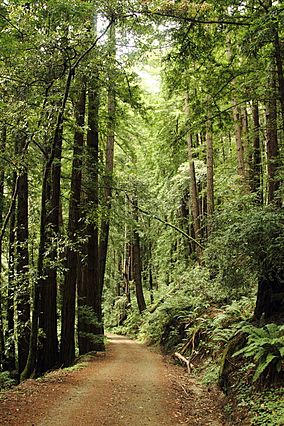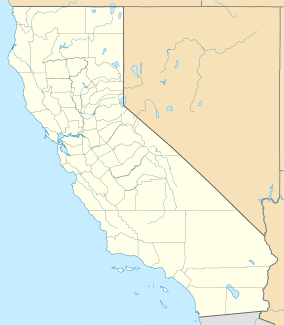Butano State Park facts for kids
Quick facts for kids Butano Creek State Park |
|
|---|---|
|
IUCN Category III (Natural Monument)
|
|

Olmo Fire Road in Butano State Park
|
|
| Location | San Mateo County, California, USA |
| Nearest city | Pescadero, California |
| Area | 4,728 acres (19.13 km2) |
| Established | 1956 |
| Governing body | California Department of Parks and Recreation |
Butano State Park is a special place in California, United States. It's a state park, which means it's protected by the government for everyone to enjoy. This park is famous for its quiet canyons filled with giant redwood trees. It's located in San Mateo County, near a town called Pescadero. The park covers about 4,728 acres and was created in 1956.
Contents
What Can You Do at Butano State Park?
Butano State Park is a great place for outdoor adventures. You can explore many miles of trails.
Hiking and Camping
The park has about 40 miles of hiking trails. These trails let you explore the beautiful redwood forests. If you like camping, there are 21 campsites where you can drive in. There are also 18 campsites you can walk into.
The park has restrooms with running water. You can find drinking water in the camping areas. There is also water in the day-use areas. Please note that there are no showers available.
For more adventurous campers, there's a special backpacking site. It's about 5.5 miles up a trail from the park entrance. This site does not have water directly. However, you can find water nearby from streams that flow during certain seasons.
Park Programs
During the summer, the park offers fun activities. You can join a guided nature walk. These walks help you learn about the plants and animals. Weekend campfire programs are also offered. They are a great way to enjoy the evenings.
Where Did the Name "Butano" Come From?
The name "Butano" has been used for many local features. These include land areas, creeks, waterfalls, and forests. The name was first mentioned in 1816 by Padre Jaime Escudet.
One idea is that "butano" comes from an old California word. This word described a drinking cup. These cups were made from the horn of a bull or other animal. Another idea is that the name comes from a Native American language. It might mean "meeting place."
 | Valerie Thomas |
 | Frederick McKinley Jones |
 | George Edward Alcorn Jr. |
 | Thomas Mensah |



